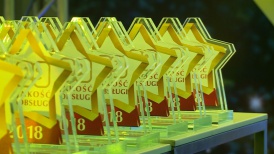| Says: | Józef Mokrzycki |
| Function: | President of the Management Board |
| Company: | Mo-Bruk |
A bright future for the waste management sector, mainly thanks to the growing awareness among consumers
The consumers' growing awareness and new regulations contribute to the favourable situation in the waste management sector. Entrepreneurs positively assess the waste transport regulations which entered into force in late January, and the decision of the Minister of the Environment on levelling off the environmental fees for segregated and mixed waste storage. Provisions increasing corporate responsibility for produced waste will also contribute to market regulation.
“The waste market is undergoing a revival, mainly due to the growing awareness among consumers and entrepreneurs, and also due to the fact that the authorities closely watch the moves of entrepreneurs, including especially those who have something to hide. “This has been partly achieved through media contribution, with numerous reports appearing on television, the radio and the press, speaking of rather inglorious practices, such as burying medical waste in one's garden, discarding waste into a gravel-pit or leaving it in the forest,” said Józef Mokrzycki, President of the Management Board of Mo-Bruk, interviewed by Newseria Press Agency.
Deputy Minister Sławomir Mazurek announced in October that the Ministry of the Environment had been working on the introduction of a financial guarantee (a deposit) for enterprises operating in the waste management sector. Such a mechanism is expected to combat illegal waste storage in the places not intended for this purpose, e.g. forests.
The funds raised through deposits collected from entrepreneurs would be used to cover potential costs of eliminating such landfill sites. Removal of a several-hundred-tone waste heap costs from a few hundred to a few million zlotys, this sum being currently covered by local government authorities.
“Dumping waste at the forest will always be considered cheaper than using systems built for several hundred million zlotys. Unfortunately, I think that many sites where illegal waste will be deposited in breach of the binding regulations will continue to appear in Poland in the foreseeable future. However, in order not to create such a gloomy picture, let me stress that decent and legally operating businesses are in the vast majority. “Nonetheless, much is still to be changed with regard to the functioning of inspection bodies and waste transport,” Mr Mokrzycki said.
New waste transport regulations became effective on 24 January, introducing detailed guidelines in this field. Vehicles intended for waste transport need to have proper marking and documentation.
“Since 1 February it has been obligatory for such vehicles to bear a “Waste” sign, which is a really big thing. Only those who have something to hide will object to using this sign. “If the law enforcement agencies meet such a person, they will make him or her confess to such infamous acts,” Mr Mokrzycki claimed.
According to the President of Mo-Bruk, the new regulations, coupled with the growing ecological awareness of society, will contribute to the increased importance of professional waste processing systems built by investors or using EU grants.
“I believe the waste sector is facing a bright future,” Mr Mokrzycki said, “Consumers' awareness is growing year by year. ‘Black sheep’ are still likely to appear, so probably in the next decade some people will still be leaving their waste in forests, but these will be exceptions. “We need to instruct children on this matter from their early years, and this duty should be assumed by parents, nursery schools, schools and entrepreneurs,” he added.
The industry has welcomed the Minister of the Environment decision on levelling off the environmental fees for segregated and mixed waste storage. This year the fee collected by the Marshal in respect of depositing a tonne of waste on a landfill site grew from PLN 74 to PLN 140. In 2019 it will amount to PLN 170 and in 2020 to PLN 270.
“Nowadays entrepreneurs can choose to recycle, process, reuse or discard their waste on a landfill site. The last option is now becoming less profitable, providing a strong argument to transfer waste for reuse,” Mr Mokrzycki explained.
The President of Mo-Brul also noted that companies should bear more severe consequences of their irresponsible waste management actions.
“We must limit the possibility of careless accumulation of waste with no financial consequences being borne by entrepreneurs,” Minister Mazurek has already spoken of introducing SENTs, i.e. inspections of every waste-transporting truck. ”Another major issue is reducing the number of companies allowed to collect waste without accounting for such activities, indicating their recipients or bearing any consequences,” Mr Mokrzycki stressed.
The Circular Economy Package adopted by the European Commission obliges Poland to increase municipal waste recycling to 65% and packaging waste to 75%, as well as to reduce all stored waste to a maximum of 10% by 2030. New regulations have also banned depositing selectively collected waste and promoted the idea of extended producer responsibility, which obliges production plants to participate in the costs of the collection, segregation and preparation for recycling of marketed packaging.
Trade

Polish consumers are more satisfied than Americans, with the customer satisfaction level being close to 80 percent
For six years the customer satisfaction index in Poland has grown by over 17 percentage points to nearly 78 percent, and it currently exceeds the customer satisfaction levels recorded in the USA and the United Kingdom. Service quality and its growing significance among businesses have had a tremendous impact on customer satisfaction. For the eleventh time the Customer Service Quality Star titles have been awarded to entrepreneurs recording the best results in this field.
